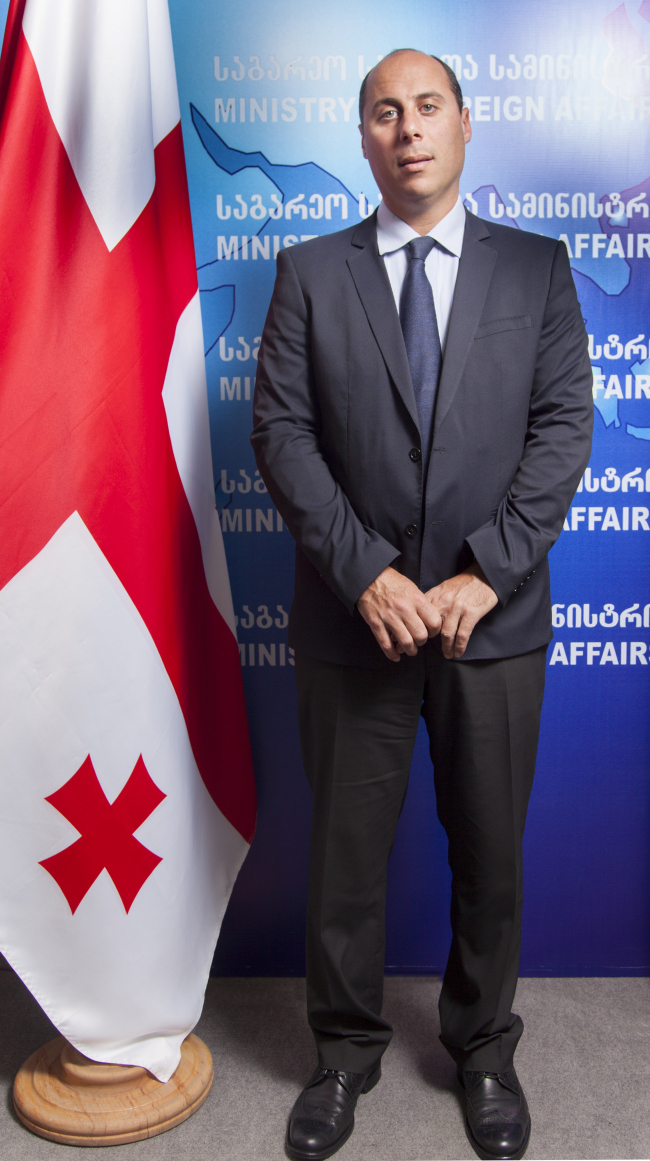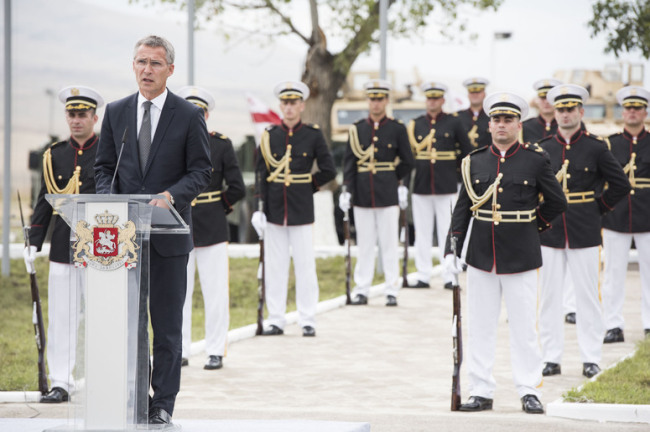Freshly minted Georgian Ambassador Otar Berdzenishvili says his country and Korea are closer in substance than their distance, sharing a common pride of national language and alphabet as well as passion for freedom and democracy.
Having assumed his post in late April, the 38-year-old wunderkind from the Caucasus country says he wants to invigorate bilateral ties with his full force, building on the achievements of his predecessor Nikoloz Apkhazava, who has been nominated to serve in Malaysia.
Berdzenishvili was previously the ambassador at large at the Foreign Ministry, ambassador to Brazil, director of the Americas Department and deputy minister of defense -- all achieved in his 30s.
As this year marks the 26th anniversary of Georgia’s independence from the Soviet Union and 25th anniversary of diplomatic relations with Korea, there is plenty to celebrate and cooperate in, the envoy stressed in his first briefing with reporters at the embassy in Seoul last week.
 |
Newly appointed Georgian Ambassador to Korea Otar Berdzenishvili (Georgian Embassy) |
“Beyond our occupied years under the Russian Empire and later Soviet Union (together starting from the late 18th century), Georgia has a proud national history of 8,000 years,” he said. “For every ambassador, increasing people-to-people contact is one of the most important things. I want more of Georgia in Korea and more of Korea in Georgia.”
In particular, Berdzenishvili expressed his desire to enhance Georgia’s presence in Korea’s think tanks and academic institutions. The man from Tbilisi, the Georgian capital, said a single cultural project can go a long way in raising awareness. Currently, some 30 Georgians reside in Korea, and 500 visit the country annually.
“Situated at the crossroads of European, Asian and Middle East civilizations, Georgia presents myriad opportunities for Korean businesses,” the diplomat highlighted. “By investing in Georgia, Korean enterprises can target not only our domestic consumer base of 3 million people, but the wider regional market of 400 million buyers.”
As a regional hub, Georgia has geographic advantages providing unfettered access to Turkey, Iran, Azerbaijan, Armenia, Ukraine and Kazakhstan, according to Berdzenishvili. He added his country has significantly shored up logistical capacities, bureaucratic efficiency and the investment climate, with a modernized banking system, a fair and impartial judiciary protecting investors’ rights and free industrial zones across the country.
Georgia has free trade agreements with the Commonwealth of Independent States of Ukraine, Belarus, Moldova, Kazakhstan, Kyrgyzstan, Tajikistan, Uzbekistan and Turkmenistan, as well as neighboring Russia, Turkey, Azerbaijan and Armenia. The country also has in force the Deep and Comprehensive Free Trade Agreement with the European Union. Additionally, it closely trades and cooperates with the European Free Trade Association economies of Iceland, Liechtenstein, Norway and Switzerland.
All foreign travelers to Georgia benefit from accessible and service-oriented customs policies and administrative protocols, including near-zero duties on 90 percent of goods, according to the Invest in Georgia promotion agency.
On the bilateral front, Georgia exports to Korea mineral water -- most notably of brands Borjomi and Nabeghlavi -- Caucasus bee honey, various wines whose cradles stretch back eight millennia and scrap metal.
Korea largely exports electronic goods, such as cellphones, televisions and other home appliances, as well as automobiles. Hyundai Motor Company, Kia Motors and Samsung Electronics have branches in Georgia.
Georgia, which has extricated its sovereignty from Russia since the independence, has pinned its hopes on joining the EU and NATO.
“We want to join the EU because we believe the organization is the only truly democratic institution in the region that Georgia can be a part of, and whose interests and values align with ours,” he claimed. “Our European dream stems not simply from the government top-down, but from the very hearts of our people. European membership will also facilitate our domestic reforms for a more mature democracy and dynamic economy.”
With the visa facilitation agreement between the two sides put in place since 2011, Georgia is briskly moving ahead toward the European family, he enunciated.
 |
NATO Secretary-General Jens Stoltenberg inaugurated the NATO-Georgia Joint Training and Evaluation Center at the Krtsanisi Military Facility outside Tbilisi in August 2015. (NATO) |
Equally critically, membership in the North Atlantic Treaty Organization has long been the country’s cherished objective, heightened by Russia’s alleged revanchism and irredentism that erupted in the Russo-Georgian War of August 2008. The five-day war resulted in Georgia ceding one-fifth of its territory -- South Ossetia and Abkhazia -- to its much larger neighbor, whose troops have entrenched military strongholds on the newly acquired land.
“We are trying our utmost to peacefully negotiate our territorial issues and have several dialogues going on with the Russian side,” the envoy said. “We are working on confidence-building measures for both Abkhazian and South Ossetian societies in the occupied territory, but if Russia continues its imperialistic means, with a ‘sphere-of-influence’ mentality, progress will be futile.”
To bulwark itself from further Russian onslaught, Georgia has strenuously striven to get its foot in NATO. The Euro-Atlantic alliance has continually reformed and expanded its organization by incorporating former Warsaw Pact members of Central and Eastern European states after the Iron Curtain fell.
During a visit to Georgia in August 2015, NATO Secretary-General Jens Stoltenberg inaugurated the NATO-Georgia Joint Training and Evaluation Center at the Krtsanisi Military Facility outside Tbilisi.
“Our soldiers are fighting shoulder to shoulder in ISAF operations in Afghanistan,” Berdzenishvili said, referring to the International Security Assistance Force, a NATO-led security mission tasked with training Afghan National Security Forces in their fight against Taliban, and assisting reconstruction of the war-torn nation.
“We want to prove that Georgia is not just a consumer of security, but an active provider,” he said.
Georgia has also contributed to NATO’s peacekeeping operations in Kosovo, and played an instrumental role in maritime counterterrorism surveillance operations in the Mediterranean, according to NATO.
At the Wales Summit in September 2014, a substantial package of measures was launched to strengthen Georgia’s defense capabilities and advance its membership preparations. Further steps to help bolster Georgia’s military strength were addressed at the NATO Summit in Warsaw in July 2016.
By Joel Lee (
joel@heraldcorp.com)






![[Exclusive] Hyundai Mobis eyes closer ties with BYD](http://res.heraldm.com/phpwas/restmb_idxmake.php?idx=644&simg=/content/image/2024/11/25/20241125050044_0.jpg)
![[Herald Review] 'Gangnam B-Side' combines social realism with masterful suspense, performance](http://res.heraldm.com/phpwas/restmb_idxmake.php?idx=644&simg=/content/image/2024/11/25/20241125050072_0.jpg)

